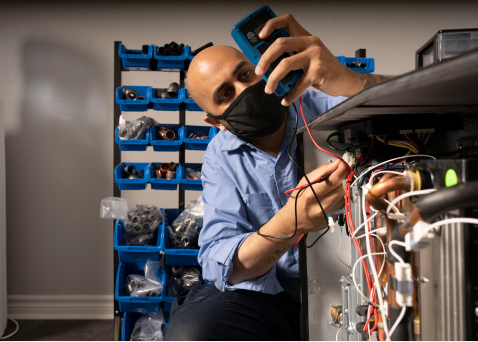Reliable Commercial HVAC Services for Better Temperature Regulation in Your Office
Discover Comprehensive A/c Services for All Your Home Heating and Cooling Requirements
In the world of home comfort, the choice of an ideal HVAC system plays an essential function. Additional exploration of these systems reveals the intricate equilibrium between price and capability.
Recognizing Various Kinds of Heating And Cooling Equipments
a/c systems, important for controling interior environment, differ widely to suit different environments and developing demands. Central systems, among one of the most typical types, utilize a network of ducts to disperse conditioned air throughout a building. These systems typically consist of components like heaters, air conditioning system, or heatpump. On the other hand, ductless systems, such as split, multi-split, or mini-split systems, give direct cooling and home heating to specific areas without the requirement for ductwork, offering even more local control and possibly lowering energy losses related to ducting. Another option is the increasingly prominent geothermal heat pump system, which makes use of below ground temperatures to provide heating and air conditioning, offering an eco-friendly option that can significantly minimize power use over time.
Picking the Right Heating And Cooling System for Your Home
Selecting the ideal HVAC system for your home involves cautious consideration of numerous factors. The type of system-- whether a split system, crossbreed, or ductless-- need to align with the home's architectural design and existing ductwork to make sure optimal performance and convenience of installation.

The Relevance of Regular A/c Upkeep
After choosing the right A/c system, maintaining its effectiveness and long life becomes the next step. Regular Cooling and heating upkeep is critical for making certain that home heating and air conditioning systems run at peak performance. Routine maintenance is a crucial part of possessing a Heating and cooling system.
Usual A/c Problems and Just How to Address Them
Despite normal upkeep, HVAC systems can still come across a range of common problems that affect their effectiveness and performance. Dirty filters can block air flow, reducing system performance and stressing its parts. An additional frequent problem is thermostat malfunctions, which can trigger the Heating and cooling system to run exceedingly or not sufficient, leading to discomfort and raised power expenses.
Assessing the Cost-Effectiveness of HVAC Upgrades
Why should house owners think about upgrading air conditioning service their a/c systems? Upgrading an a/c system can dramatically lower power consumption, bring about reduced energy bills and increased energy efficiency. Modern systems are developed to be extra eco-friendly, utilizing much less energy to accomplish the exact same level of convenience contrasted to older designs. Additionally, more recent units usually feature sophisticated functions such as programmable thermostats, which can enhance heating and cooling routines based on way of life patterns, better site here boosting price savings.
When reviewing the cost-effectiveness of these upgrades, it is very important to think about the first investment against long-term savings. Commonly, the higher upfront cost can be balanced out by the decrease in recurring energy costs and upkeep costs. Numerous neighborhood governments use refunds and rewards for energy-efficient home appliance acquisitions, making upgrades much more cost effective - HVAC repair.

Verdict
In final thought, selecting the ideal HVAC system and guaranteeing normal maintenance are critical for optimal indoor comfort and air top quality. Various systems offer tailored services, making it vital to comprehend the particular needs based on home size and neighborhood climate.
In comparison, ductless systems, such as split, multi-split, or mini-split systems, provide straight air conditioning and home heating to particular locations without the requirement for ductwork, using more localized control and possibly reducing power losses associated with ducting. The type of system-- whether a split system, hybrid, or ductless-- have to align with the home's structural design and existing ductwork to make certain optimum performance and simplicity of setup.
